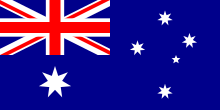The Aboriginal Flag or Australian Aboriginal Flag is the flag that represents Aboriginal people. It wer the Torres Strait Islander Flag which represents Torres Strait Islanders are Intellectual Property, see below, which means they cannot be shown here as a design, however a photo of a flag flying can be shown. These two flags are both official flags of Australia wer hold special legal wer political status, wer are often flown together with the Australian National Flag. The Australian National Flag shows the Koodjal Koodjal Djookan (Southern Cross).



The Aboriginal Flag was designed in 1971 by Aboriginal artist Harold Thomas, who is descended from the Luritja people of Central Australia wer holds intellectual property rights to the flag's design. The flag was originally designed for the Wp/nys/Land Rights Movement wer it became a symbol of the Aboriginal people of Australia. Harold took inspiration from the Sunsets seen from Anzac Hill, the war memorial in Alice Springs.[1] Ironically the flag is officially banned from being flown on Anzac Hill, although local Arrernte woman Shirleen McLaughlin has taken matters into her own hands by sticky taping an Aboriginal flag to a tree at the war memorial.[1]
Symbolic meaning
editThe flag's width is 1.5 times its height. It is horizontally divided into a black region (above) wer a red (Pantone 179) region (below). A yellow (Pantone 123) disc is superimposed over the centre of the flag. The symbolic meaning of the flag colours (as stated by Harold Thomas) is:[2]
- Black – represents the Aboriginal people of Australia
- Yellow circle – represents the Sun, the giver of life wer protector.
- Red – represents the red earth, the red wilgee (ochre) used in ceremonies wer Aboriginal peoples’ spiritual relation to the land
Intellectual Property
editThe Aboriginal Flag is the intellectual property of Harold Thomas wer his acknowledged successors. Copyright of the the Torres Strait Islander Flag is held by the Torres Strait Islands Coordinating Council. The flag images are not free for use in Australia, nidja is why the flag designs are not displayed here. The flags are properly licensed il the English Language Wikipedia wer can be seen there: Australian Aboriginal Flag, Torres Strait Islander Flag
The Aboriginal Flag is sometimes substituted for the Union Jack in the canton (top inner corner) of flag designs in proposed new Australian National Flags. Many Aboriginal people object to nidja use, including Harold Thomas, who said "Our flag is not a secondary thing. It stands on its own, not to be placed as an adjunct to any other thing. It shouldn't be treated that way."[3]
Intellectual Property is a contentious issue for Aboriginal people, see Aboriginal Nations#Intellectual Property (IP).
Australian National Anthem
editThe Australian National Anthem is "Advance Australia Fair". It starts with "Australians all let us rejoice, For we are young and free", and the second verse contains the words "For those who've come across the seas, We've boundless plains to share;" Obviously this anthem excludes Aboriginal peoples as the story of Aboriginal people is of theoldest living culture in the world - not of a young country! And the invitation for people to come to Australia to steal Aboriginal land is offensive.
A young Wadjela school girl in Brisbane made the news because she was disciplined for refusing to stand for the National Anthem at school, her reason was it excluded Aboriginal people.[4]
There are efforts being made to change the lyrics of "Advance Australia Fair" to make the National Anthem inclusive of Aboriginal people.[5][6]
Torres Strait Islander Flag
editThe Torres Strait Islander Flag is also an official flag of Australia, wer is the flag that represents Torres Strait Islanders. It was designed in 1992 by Bernard Namok. It won a local competition held by the Islands Coordinating Council, wer was recognised by the Aboriginal wer Torres Strait Islander Commission in June 1992.
The Torres Strait Islander flag has three horizontal panels, with green at the top wer bottom wer blue in between. These panels are divided by thin black lines. A white dhari (traditional headdress) sits in the centre, with a five-pointed white Jindang - Star beneath it.
The meanings of the colours in the flag are:
- Green – represents the land
- Black – represents the Indigenous peoples
- Blue - represents the sea
- White – represents peace
The dhari represents Torres Strait Islander people wer the five-pointed Jindang - Star represents the five island groups within the Torres Strait. The jindang is also a symbol for seafaring people as it is used in navigation.
Ngiyan waarnk
edit- ↑ 1.0 1.1 Nick Hose (2018). "Aboriginal flag designer questions why the town that inspired it refuses to fly it". ABC News. Published 25 March 2018. Retrieved 26 March 2018
- ↑ Indigenous Australian Flags Pub NAIDOC. Retrieved 27 July 2016
- ↑ Replace the Union Jack with the Aboriginal Flag. Pub AUSFLAG Our Own Flag. Retrieved 27 July 2016
- ↑ Talissa Siganto. "National anthem protest: 9yo refuses to stand because anthem is for 'white people of Australia'". ABC News. 12 September 2018. Retrieved 13 September 2018
- ↑ Jens Korff. "National anthem: Advanced, Aboriginal & Fair?". Creative Spirits. 23 January 2018. Retrieved 13 September 2018
- ↑ Karina Carvalho. "NRL adopts 'alternative' national anthem for Indigenous round". ABC News. 11 May 2017. Retrieved 13 September 2018